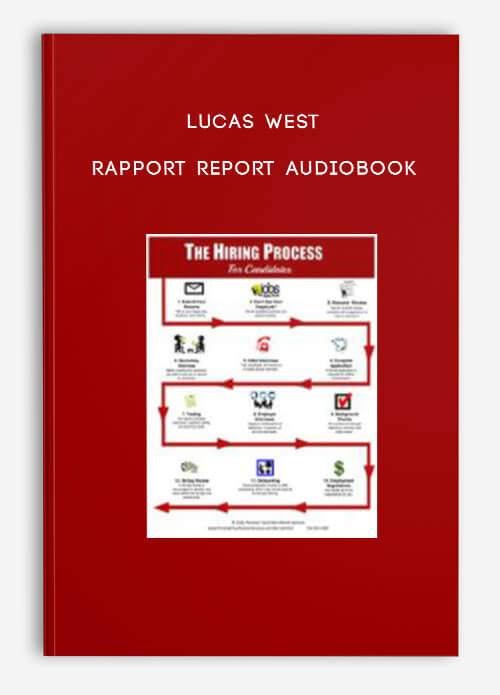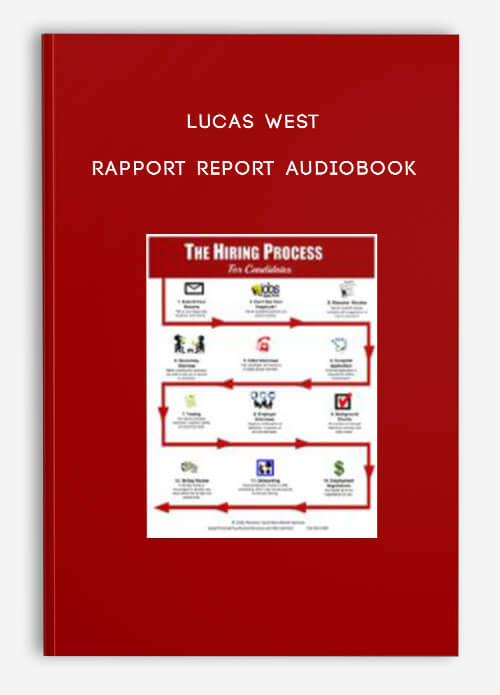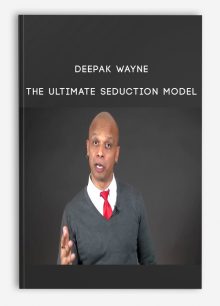Rapport Report Audiobook by Lucas West
$29.00
Product Include:
File size:
Rapport Report Audiobook by Lucas West
**More information:
Get Rapport Report Audiobook by Lucas West at Salaedu.com
Description
When you get your unconscious in agreement with your conscious, which is then in agreement with your “higher self,” you are congruent. Any desire acted upon in this state of congruence is going to succeed, nearly 100% of the time.Here’s the thing: IF you focus ALL your attention inward, IF you become aware of your internal conflicts and REMOVE them completely, then there really is no need for external rapport.Of course, external rapport can still be useful, but in limited context. For a simple example, if you get pulled over by a cop, rapport is a useful skill (rapport with authority figures is practical).Other times in your life, rapport is unnecessary.Rapport is definitely not important in the dating game.1 No matter what the dating gurus tell you, rapport is not a skill to be applied to dating, until you’re already in the relationship.When you have congruence, control over your Self and your environment are natural byproducts of that state. If you’ve ever had those moments where you just knew it was going to be a good day and you turned out to be correct, that is an example of congruence. Even your negative outcomes are a result of congruence, because they’re based on your negative outlook.As long as your thoughts and your programming are in sync, the mechanism doesn’t really care if it’s positive or negative. So, the question is, how do you maintain the internal rapport you desire? It’s a simple little technique, so I’ll elaborate on ways to finding out your incongruencies. The Rapport ReportProduct 1 of 5 For Info on the Power & Control Series:Page 6Log on to http://www.lucaswest.com/announcement1 Please note that this does NOT mean that you try to break rapport. There is a term in theseduction community called “negging.” This is NOT negging. What I’m talking about is not putting any effort towards rapport, nor towards breaking it when it happens. You’ll find that rapport will happen on its own, usually from the woman putting in the effort.
Step 1First of all, stop making excuses for yourself. Don’t start tomorrow or day after or Monday. A delay of any sort is an excuse.If you’re awake, you have time. Do it now. If you have a headache, take something for it and do it in an hour. If you have time to read this, then you’re definitely not doing anything else that can warrant a justification for procrastination.Action is a sure-fire way towards congruence. For all intents, it doesn’t matter if the thought patterns come first. As long as you’re taking a step toward being the kind of person you want to be, actions and thoughts are on near even playing field.When you work at achieving congruence at ALL levels, both action and thought have to be focused on the same goal. And all your goals have to be geared toward giving you power, control, and authority. Any thoughts/actions not going in that direction need to be weeded out.One way to do this is to make a list (carry it around with you day and night) every time you come up against a block of ANY kind. Any time you make an excuse to not do what you want/need, you’ve come across an incongruence.For example, for seduction, why didn’t you go up and talk to that woman? Write downall your bullshit excuses (“she was with friends,” “I was tired,” “I couldn’t think of anything to say,” “her boyfriend was with her”). Think of all the beliefs that have to exist in order for your excuse/inaction to be “valid.” Do yourself a favor and write down any excuse for any inaction you ever come across. This is extremely useful for any issues with women, but IT ALSO WORKS IN OTHER AREAS. When I say use it for ANY block, I mean it. Sometimes, it’s the same belief that holds you back in more than one arena. The same excuse you use at work could be the same that you come across in seduction. In fact, it might be easier to find limitations for one problem when trying to solve another. Just the simple act of writing down your blockages as you come across them raises your levels of self-awareness all across the board. After a week or two, you automatically start examining your behaviors and find your excuses annoyingly repetitive (and sometimes irrelevant).Side Note:While it’s not essential, I’d like you to start the list of excuses only as they come up. That is, leave the past in the past and start fresh from today. You’ll have your hands full enough with material to keep you busy. It’s been my experience that recollection of past events taints the The Rapport ReportProduct 1 of 5 For Info on the Power & Control Series:Page 7Log on to http://www.lucaswest.com/announcement
results slightly, as it can be inaccurate and exaggerated. So, imagine you never had any problems prior to today, and start on a clean slate.Step 2As you’ve written out your excuses, make it a weekly habit to start connecting the dots. Take a look at any consistencies and themes that form your mental roadmap. This is an exercise you really ought to be doing once a week for the rest of your life.Find out any particular sticking points in your list of excuses. How many repetitions and similarities do you see? Not just in the realm of women/dating or work, but all across the board?Almost as important, how many contradictions do you see? Human beings are all inconsistent, so you’re likely to see a few cases over time where you believe one thing in one moment, and its opposite a week later (and then back again).Step 3Once you’ve identified your important sticking points, running themes, and contradictions, it’s time to start having some fun with this.You’re going to be doing some mental experimentation on changing your belief systems to become a more congruent person.When it comes to belief changes, the path of passive change is always the least successful. You have to be like a detective,actively seeking out the problems and connecting the dots. You can’t let the clues and revelations come to you. You have to be able to step back and see how it all fits with your other problems; what pieces are out of sync, and what parts you can exploit.In the persuasion field, I’m known as a major proponent of progressive conditioning. Simply put, progressive conditioning breaks down a particular problem into tiny pieces that all contribute individually to the larger whole. You tackle the pieces to eliminate the problem.In my mailing list, I give a lot of pieces away, but I remain mostly general. For the most part, I have to: most problems manifest themselves differently in each person.But, more importantly, you have to becomeactive in eliminating your own problems and figuring out their causes. A good hypnotist can get rid of your The Rapport ReportProduct 1 of 5 For Info on the Power & Control Series:Page 8Log on to http://www.lucaswest.com/announcement
troubles without your active participation, but it seldom works as well or as permanently. When you energetically participate in the problem solving, that action itself builds congruence. It demonstrates to yourself the willingness to change, and facilitates further changes.So, here’s how you become a detective:First, set aside your most important problems. We’re going to tackle those from the side. We’ll hit them head on in the future.Instead, make a list of all the places where similarities occur andhit the problems at the weakest point.As an example, let’s say you’re a procrastinator. You don’t get off your ass to change anything about yourself. I don’t know what thoughts and excuses show up when you’re trying to change, but I’m willing to bet it happens when you’re thinking about losing weight, learning a new skill, etc.So, which one of those issues is easiest to tackle? Have you been putting off something for a long time that will be easier than something else that you’ve also been putting off? For example, is it easier to repaint your house than it is for you to learn French? Are you using the same excuses for both?If so, make a decision to do one of themtoday and DO IT. No excuses. Just do it, as the sneakers say.It doesn’t matter if your problem is procrastination or if it’s something else entirely. Find something that is a relatively easy problem to solve and work towards solving it.Similarly, where in your life can you change your way of thinking the easiest? In my experience, it’s most difficult to change when it comes to approaching women (if that happens to be one of your problems). But, some of those same thoughts that run through your head in that realm also occur elsewhere in your life.Self-esteem issues, for example, run throughout a person’s life. But some areas allow us to have more confidence than others. Build on those areas, and gain a level of power, confidence, control, and authority. They will bleed into the other areas, and give you insight on how to speed up your internal rapport in general.The Rapport ReportProduct 1 of 5 For Info on the Power & Control Series:Page 9Log on to http://www.lucaswest.com/announcement
The point here is to exploit the weaknesses in your thinking, wherever you can. And build upon the strengths to make them stronger, wherever you may find them. You want to get to the point where you come from a position of authority so that others defer power to you. That’s when rapport becomes unnecessary.One of the greatest weaknesses in your thinking are the aforementioned contradictions. Examine them carefully. They can help you find loopholes in your behavior that will allow you to change even faster.For example, if you think one way about something today, but have thought about it differently before/after, what were the circumstances that allowed the inconsistency?Can you manipulate the circumstances to bring up the contradiction consciously?If so, can you apply the same circumstances to other parts of your life?At the very least, whenever you observe the inconsistency, and carefully dissect it, the unconscious recognizes its silliness. And the more it comes up, the more it has to loosen its grip on the root cause of the problem. Over time, the very act of self-observation (and determination through action) gives the subconscious the flexibility to regularly bring about changes in behavior.It’s essential that you take steps toward changing your thinking as well as your actions. They both feed off each other and send the right messages to your subconscious to bring about a greater sense of internal rapport.The Rapport ReportProduct 1 of 5 For Info on the Power & Control Series:Page 10Log on to http://www.lucaswest.com/announcement
Final Thoughts & ExerciseWhile this report and set of exercises are by no means exhaustive, I do hope that you’ll keep up with them, as they are a critical foundation to making yourself more self-aware (and therefore more capable of changing your own behaviors).Over time, you’ll start to see some significant changes, and I’ll be here to help in any way I can. In the meantime, I want to leave you with a few final thoughts that tie into what’s already been written.Earlier, I mentioned a particularly simple model of the mind that most people are quite familiar with. It’s the conscious/unconscious/super-conscious split. I want to suggest to you a different model that may be useful to you in the future. It’s called the“No Such Thing” model. It’s the belief that there’s no “real” separation between conscious, unconscious, super-conscious minds. It’s allonemind moving toward one goal.Truthfully, there isn’t a separation. These are mental constructs to help understand the parts we’re not typically in control of and contrast them with parts that we can consciously change. We can’t consciously control our breathing; therefore, science has named it a function of our unconscious mind.Except that it’s not really true. If you spend enough time and discipline yourself, youcan slow down your breathing to almost nothing. You can even stop your heart-beat and brain activity. In other words, there is nothing that is not in our own control and, therefore, nothing that lies strictly in the realm of the unconscious.And that’s what we’re moving towards with these exercises. We’re looking for enough discipline and understanding about how we act so that we are in control whenever we want to be. And, if we can control our ourselves, we can control our environment. If you’re consistently acting in congruence, the separation of the three parts of the mind disappears, as does the need for external rapport. It will take time, patience and discipline, but once you dissolve your internal conflicts, you’ll notice:You already HAVE rapport with your external environment.The Rapport ReportProduct 1 of 5 For Info on the Power & Control Series:Page 11Log on to http://www.lucaswest.com/announcement
Any doubts and fears and frustrations (or, conversely, power, confidence and authority) that you have are automatically projected on some level to the people you’re dealing with and to the environment you’re in. They already “know” what’s going on in your head. You already have rapport with your environment.I don’t mean that in the new-age way, really. I mean that, to a very large extent, your external world is inside your head. It is inseparable from the way that you think. The way that you see the world has everything to do with the way you’ve trained yourself to see it.And, when you’re thinking and acting with congruence, the rest of the world seems to act according to your will. That’s because yourunderstanding of the external world changes. That kind of power is palpable. And people are drawn to the kind of person who wields it.Those in control don’t need to actively seek out approval anymore; they already have it. And others strive to be on the same wavelength as them.The moral of the story is, control what’s going on in your head and the rest of the world is also in control.Years ago, a girlfriend of mine and I were once making fortune cookies for another friend’s birthday. We had a whole bunch of silly fortunes that we wrote. Most of them were off-the-wall. Then, I wrote one that said,“The very next thought you think is going to come true.” I thought that was such a great fortune to give someone. Imagine that were true; I’d immediately wish that a plane full of Swedish bikini models needed a place to crash for the night.But when my friend opened up her birthday fortune cookie, she gasped in horror. “How could you write something so awful?” Apparently, she wasn’t in control of her thoughts, and her very next thought was a BAD one. It completely freaked her out and ruined her night. I’m sure whatever she thought came true. The Rapport ReportProduct 1 of 5 For Info on the Power & Control Series:Page 12Log on to http://www.lucaswest.com/announcement
Your job is to be in control of all your “next thoughts.”Here’s another really good internal rapport building exercise that helps you gain control of your thought processes. Try to do this for one hour or longer, if you can. It’s hard, but you only have to do it once every two months. It’ll give you a very good indication of where you are with your thinking.Make a list of four groups:1.good thoughts2.bad thoughts3.useful but neutral4.useless and neutralNow, categorize all your thoughts for the hour into these four groups. Do your best not to try and control what you’re thinking. You want to get the most honest results that you can.Are your thoughts generally positive? Generally negative?Or, are they more vague? “Useful but neutral” would be thoughts like to-do lists. “Useless and neutral” would be daydreams and flights-of-fancy.The more aware you are of your thinking, the more in control you are of your thinking. Therefore, become aware of your thoughtsand you almost automatically become more congruent
1 review for Rapport Report Audiobook by Lucas West
Add a review Cancel reply
Related products
HYPNOSIS - NLP Courses
HYPNOSIS - NLP Courses
Doña Eugenia Pineda Casimiro – The Healing Potential of Sacred Mushrooms











king –
We encourage you to check Content Proof carefully before paying.“Excepted” these contents: “Online coaching, Software, Facebook group, Skype and Email support from Author.”If you have enough money and feel good. We encourage you to buy this product from the original Author to get full other “Excepted” contents from them.Thank you!